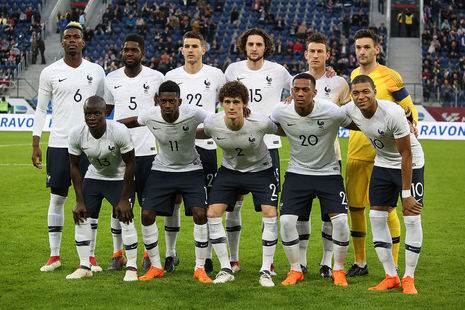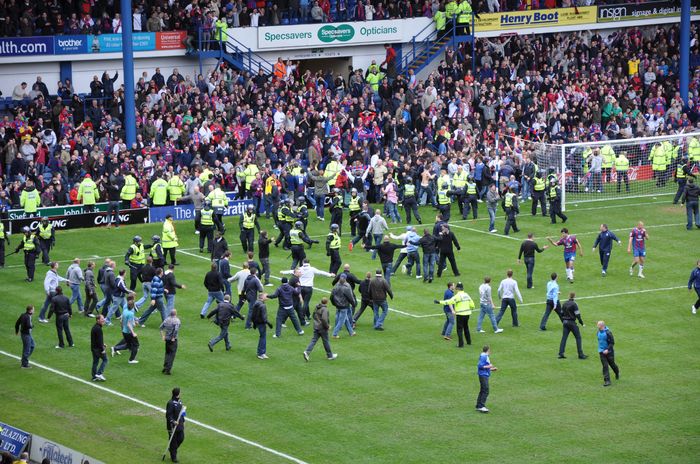The idiosyncrasies of French football commentary
Jack Wadding explores the differences between commentary in England and across the Channel, and how it affects his viewing experience

Football commentary is a strict discipline. Despite the overused criticism of “the co-commentator doesn’t know what he’s on about”, or that the primary commentator is biased, the art of presenting a televised football match is much harder than it seems. While it may be taken for granted by the majority of committed football fans, the leading factor in the pursuit of perfect commentary is a mastery of language, and football really does have its own language. When else would you use the words ‘pole-axed’, ‘talismanic’, or ‘aplomb’? When else would you use yards as a measurement of distance? To employ such terms appropriately is of absolute necessity in the world of commentary and, therefore, in the day-to-day discussion of the sport.
But that’s only in English. The opportunity to live in Paris this year has opened my ears to the similarly niche idiosyncrasies of French football commentary and, although I speak no others, I’m confident that every language will have its own footballing quirks. So, here’s what the French do when it comes to the language of football.
One of the first differences I noticed when watching French football is the use of a singular verb conjugation following the name of a team. Put simply, this means that you would find phrases like “PSG a gagné” (PSG has won) or “l’OM va perdre” (Marseille is going to lose). For anyone who has ever watched American sports, this is very reminiscent of American commentary.
“You’d never catch Martin Tyler using ‘BHAFC’ to talk about Brighton, or ‘NUFC’ for Newcastle during a match”
What is really interesting is that this is grammatically correct, in both English and French. But in British commentary for almost any sport, you would never find this, and hearing it from an American commentator sounds frankly unnatural. In the UK, you would only ever find a plural conjugation, for example: “Man City are top of the table”, “Liverpool have won the league”, even though the club is a single entity.
My favourite French quirk, however, is the names used to describe their clubs. First of all, French football clubs have quite unique names to begin with. The most common addition to an English team’s name is FC. It’s so common, in fact, that we no longer bother to say it, assuming that it is always there. The situation is similar in Spain, where eight of the twenty La Liga teams use either FC or CF. But in France, only four of the top twenty use FC.
It is far more common to find variations like Stade (Stade Brestois, Stade de Reims, and Stade Rennais), Racing Club (RC Strasbourg, or RC Lens), and Olympique (Marseille, Lyon). Others include LOSC (Lille), SCO (Angers), or ESTAC (Troyes). Due to their unique nature, these acronyms are used as synonyms for the clubs themselves. So, it is very common to hear commentators talk about “le LOSC” (all one word like losk), “l’OM” or, my personal favourite, “les Scoïstes”. While this all seems fairly reasonable, if you imagine applying the same logic to Premier League teams it does sound rather odd. You’d never catch Martin Tyler using ‘BHAFC’ to talk about Brighton, or ‘NUFC’ for Newcastle during a match.
“French commentary has struck me, from a neutral perspective, as notably biased”
Similarly, French commentators are noticeably fond of nicknames. While they certainly exist in the UK, they are relatively rarely used. Of course, this varies. For instance, you would probably only ever use ‘Wolves’ rather than ‘Wolverhampton Wanderers’, but nicknames like ‘The Red Devils’ are generally reserved for written articles where ‘Manchester United’ has been used one too many times. This is roughly the case in France, where I have heard some nicknames more than others. For example, “Les Dogues” (Lille) is a popular back-up for “le LOSC” and “Les Canaris” (Nantes) is also widely used. But where this becomes the most entertaining is in French commentary of English football, where awareness of popular or redundant nicknames seems somewhat lacking - Manchester City will, almost without fail, be referred to as “Les Cityzens”, a name that, frankly, I didn’t know existed.
But the most common nickname inside France is perhaps the most basic, but something that is certainly a surprise to the English ear. More often than not, a team will be referred to almost as a place of origin or nationality. For example, you’d be most likely to hear Lens referred to as “les Lensois” or PSG as “Les Parisiens”. While this is very widespread in English commentary of international football (e.g. “the Germans”), it is almost unheard of in club football. Imagine hearing Manchester United described as “the Mancunians”, or Norwich as “the East Anglians”. What’s better is that these adjectives are used to describe more than just the teams. Indeed, it is incredibly common to find phrases like “la frappe monégasque” (the Monaco shot), “le centre niçoise” (the Nice cross), and “l’attaque angevine” (the Angers attack). These can also apply to teams from other countries, as with the phrase “madrilène” (of Madrid), but I’m yet to hear any English-based versions.
Finally, French commentary has struck me, from a neutral perspective, as notably biased. Naturally, in some contexts, British commentary is permitted to be biased, for example when one of the home nations is playing. When it comes to club football, however, it is strictly forbidden. While this is certainly the case for domestic French football, it most definitely is not in continental competitions. The Europa League game between Galatasaray and Marseille at the end of September, for instance, was a very tight 0-0 draw and, with ten minutes left on the clock, the commentators became explicit with their affiliation. When Marseille won the ball back, a guttural “ouiii” came from the co-commentator; having been awarded a throw-in, he exclaimed “vite, vite, jouez messieurs” (quick, quick, play gentlemen); and when Galatasaray lost possession, he said “ballon rendu, merci” (ball given back, thank you very much). Certainly beyond the limits of British broadcasting neutrality.
Such are the idiosyncrasies of French football commentary. Surprising as they are, I imagine that the unique nature of British footballing language provides just as much entertainment to those in foreign countries. I would say we could learn a thing or two from our continental neighbours but, realistically, the language of football will not be changing any time soon.
 Features / Should I stay or should I go? Cambridge students and alumni reflect on how their memories stay with them15 December 2025
Features / Should I stay or should I go? Cambridge students and alumni reflect on how their memories stay with them15 December 2025 News / Dons warn PM about Vet School closure16 December 2025
News / Dons warn PM about Vet School closure16 December 2025 News / Cambridge study finds students learn better with notes than AI13 December 2025
News / Cambridge study finds students learn better with notes than AI13 December 2025 News / News In Brief: Michaelmas marriages, monogamous mammals, and messaging manipulation15 December 2025
News / News In Brief: Michaelmas marriages, monogamous mammals, and messaging manipulation15 December 2025 Comment / The magic of an eight-week term15 December 2025
Comment / The magic of an eight-week term15 December 2025










